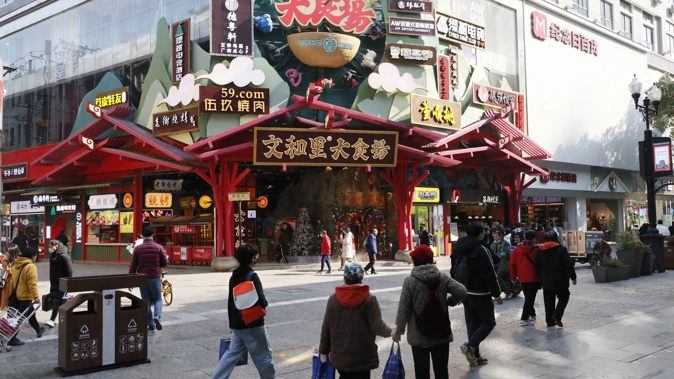
China's authorities missed a crucial chance to curb the spread of Covid-19 in the early days of the pandemic, according to a Taiwanese infectious diseases expert who was one of the first foreign officials to discover the virus was spreading between humans.
Professor Chuang Yin-ching, a senior member of Taiwan's Centres for Disease Control (CDC), has now had two years to draw conclusions from a defining point in his career, when he was dispatched to Wuhan on January 13-15, 2020, to investigate reports of a new Sars-like coronavirus.
In an interview with The Telegraph this week, he recalled the moment he grasped the seriousness of the situation during a meeting where experts from Taiwan, Hong Kong and Macau grilled officials from the Wuhan and Hubei province CDC and the central government authorities in Beijing.
From the outset, the local officials and chairperson had appeared evasive, insisting there was no evidence of human-to-human transmission despite repeated questioning.
"Different people asked over and again about the issue of human-to-human transmission from different angles. For example, 'do Wuhan people like to eat game meat?' He answered, 'people in Wuhan don't like to eat game meat'. Everybody laughed," he said.
Prof Chuang pressed for information about two known family clusters, including one unexplained, significant case of a husband who worked at the Huanan seafood market – the suspected ground zero of the outbreak – who appeared to have passed the virus onto his wife who had not visited the location.
"I asked, other than two clusters are there any other similar situations? He said no. What I wanted to know is, other than two clusters, maybe there is a third cluster of cases? He said no. My real question was 'is there a possibility of human-to-human transmission?'" he explained.
"And finally, because I was sitting in front of the local and central government authorities I could see the body language – he [Beijing official] tried to intervene, he put up his hand to try to stop the local authorities talking," he said.
"Finally, the person from the central government said 'why did you say the old conclusion? Now the conclusion is limited human-to human transmission cannot be excluded'. That was the answer we wanted to know."
The admission coincided with the first recorded case of Covid-19 outside of China, in Thailand, on January 13.
Prof Chuang did not disclose the name of the mystery senior Beijing health official who confirmed the human transmission conclusion, although he revealed it was not George Gao, head of the Chinese Centre for Disease Control and Prevention.
He does not know how far up the chain of command the knowledge reached, nor why local officials chose to sit on the alarming data for days before warning the public or taking more preventive action.
The admission coincided with the first recorded case of Covid-19 outside of China, in Thailand, on January 13. Photo / Getty Images
On January 22, as millions travelled round China for Lunar New Year celebrations, the WHO issued a statement saying there was evidence of human-to-human transmission in Wuhan but more investigation was needed to understand the full extent of transmission.
Prior to the statement, on January 18, Wuhan's leaders gave the green light to a Guinness world-record attempt to create the largest ever potluck dinner, with 40,000 families in attendance. By early February, dozens of residential buildings in that neighbourhood had been designated "fever buildings."
Zhou Xianwang, then Wuhan mayor, said permission for the event was granted on the basis that human transmission was "limited."
But for Prof Chuang, who by that point was back in Taipei warning the Taiwanese government to tighten border controls and step up its epidemic prevention measures, "limited" still meant the virus was spreading between humans.
He does not know if the pandemic could have been stopped in Wuhan but said: "At least they could have tried to minimise the impact and to contain the pandemic in a limited area, limiting the possibility of it spreading to the rest of the world."
It could have been a mistake, or the authorities were perhaps not taking the situation seriously enough, he suggested.
However, the Wuhan briefing had raised more questions than it answered. He was "suspicious" when their hosts only gave an oral presentation, without offering written epidemiological, objective data as would have been expected. "I had kind of an off feeling," he said.
The session began with a statement clarifying the number of cases was 41, with 28 linked to the Huanan market. No explanation was given for the remaining 13.
With hindsight, Prof Chuang realised they had been given "outdated" information. "They only released what they wanted to release," he said.
Taiwan has long distrusted China on healthcare matters. Taipei has previously accused Beijing – which claims Taiwan as its own territory – of delaying vital assistance during the deadly Sars outbreak in 2003.
But Hong Kong experts also felt growing disquiet in early January 2020. One, who had close knowledge of the Chinese CDC at the start of the pandemic, said he was "horrified" when officials insisted the situation was under control even as Wuhan locked down on January 23.
The expert, who spoke anonymously out of fear of repercussions, alleged the Chinese had initially persuaded the WHO not to call the crisis a Public Health Emergency of International Concern – despite evidence to the contrary – "so they didn't lose face in the eyes of the world."
This PHEIC declaration was finally made on January 30.
However, Prof Chuang admits that he too, in the chaotic early days of the pandemic, had no idea about the full significance of the meeting or the predicament the world was now facing.
"I didn't expect that from then on Covid-19 would become a pandemic, and very serious infection, until now. I didn't expect that," he said.
- by Nicola Smith, Daily Telegraph UK
Take your Radio, Podcasts and Music with you









